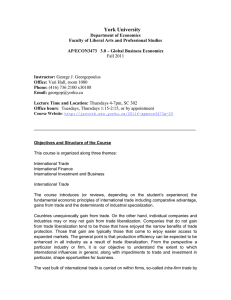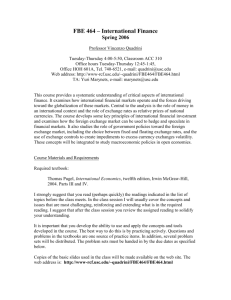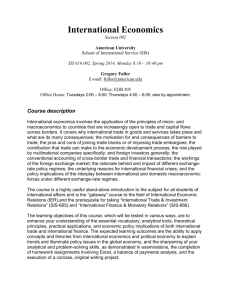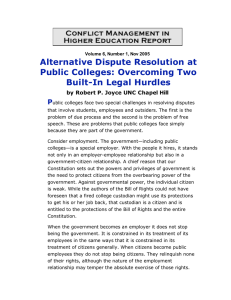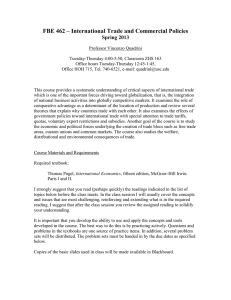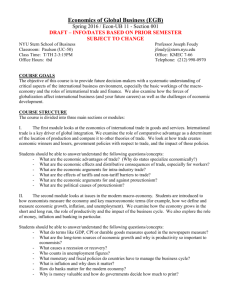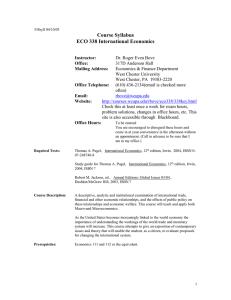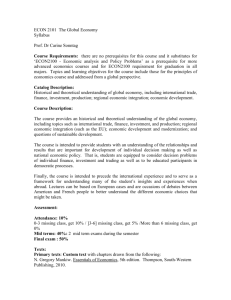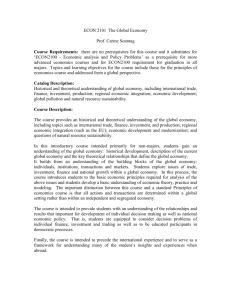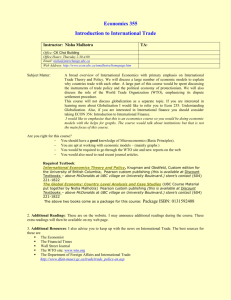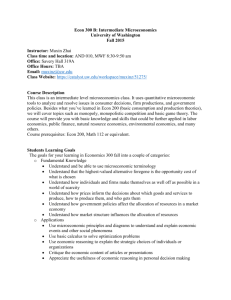Link to syllabus
advertisement
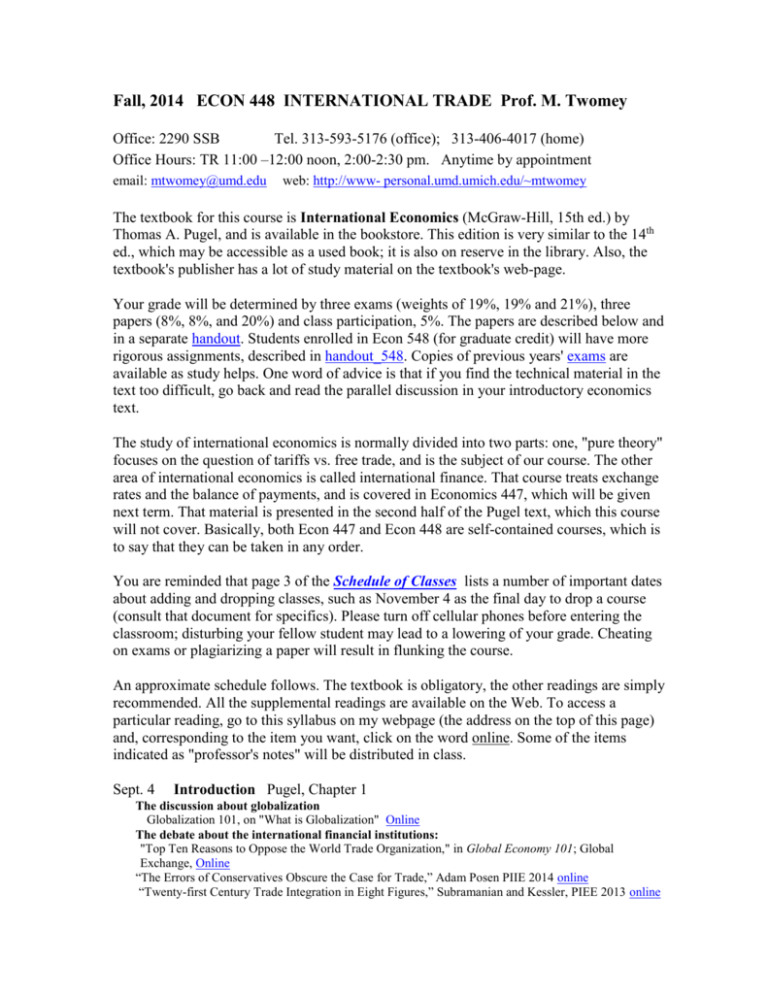
Fall, 2014 ECON 448 INTERNATIONAL TRADE Prof. M. Twomey Office: 2290 SSB Tel. 313-593-5176 (office); 313-406-4017 (home) Office Hours: TR 11:00 –12:00 noon, 2:00-2:30 pm. Anytime by appointment email: mtwomey@umd.edu web: http://www- personal.umd.umich.edu/~mtwomey The textbook for this course is International Economics (McGraw-Hill, 15th ed.) by Thomas A. Pugel, and is available in the bookstore. This edition is very similar to the 14th ed., which may be accessible as a used book; it is also on reserve in the library. Also, the textbook's publisher has a lot of study material on the textbook's web-page. Your grade will be determined by three exams (weights of 19%, 19% and 21%), three papers (8%, 8%, and 20%) and class participation, 5%. The papers are described below and in a separate handout. Students enrolled in Econ 548 (for graduate credit) will have more rigorous assignments, described in handout_548. Copies of previous years' exams are available as study helps. One word of advice is that if you find the technical material in the text too difficult, go back and read the parallel discussion in your introductory economics text. The study of international economics is normally divided into two parts: one, "pure theory" focuses on the question of tariffs vs. free trade, and is the subject of our course. The other area of international economics is called international finance. That course treats exchange rates and the balance of payments, and is covered in Economics 447, which will be given next term. That material is presented in the second half of the Pugel text, which this course will not cover. Basically, both Econ 447 and Econ 448 are self-contained courses, which is to say that they can be taken in any order. You are reminded that page 3 of the Schedule of Classes lists a number of important dates about adding and dropping classes, such as November 4 as the final day to drop a course (consult that document for specifics). Please turn off cellular phones before entering the classroom; disturbing your fellow student may lead to a lowering of your grade. Cheating on exams or plagiarizing a paper will result in flunking the course. An approximate schedule follows. The textbook is obligatory, the other readings are simply recommended. All the supplemental readings are available on the Web. To access a particular reading, go to this syllabus on my webpage (the address on the top of this page) and, corresponding to the item you want, click on the word online. Some of the items indicated as "professor's notes" will be distributed in class. Sept. 4 Introduction Pugel, Chapter 1 The discussion about globalization Globalization 101, on "What is Globalization" Online The debate about the international financial institutions: "Top Ten Reasons to Oppose the World Trade Organization," in Global Economy 101; Global Exchange, Online “The Errors of Conservatives Obscure the Case for Trade,” Adam Posen PIIE 2014 online “Twenty-first Century Trade Integration in Eight Figures,” Subramanian and Kessler, PIEE 2013 online "Enemies of the WTO: Bogus Arguments against the WTO," by Paul Krugman (Slate) November 1999. “As Other Nations Prosper, So Will the United States,” Lawrence and Edwards PIEE 2013 online Newspaper articles about suspension of WTO negotiations: online1 Sept. 9, 11 Basic Theory, using Supply and Demand Sept. 16, 18 Comparative Advantage Pugel, Chapter 2 Pugel, Chapter 3 The professor's notes Online Sept. 23 Factor Proportions Pugel, Chapter 4 Sept. 25, 30 Who Gains and Who Loses with Trade? Appendix B) Pugel, Chapter 5 (+ glance at "Does Globalization Make the World More Unequal?" by Peter H. Lindert & Jeffrey G. Williamson, one page summary of NBER Working Paper No.w8228 April 2001 Online "Europe's textile war with China," Economist Aug. 29, 2005 online "Twisted Threads in US China Trade," Businessweek August 19 2005 online Oct. 2 Alternative Theories of Trade Oct. 7 Pugel Chapter 6 FIRST EXAM Oct. 9, 14 Growth and Trade Pugel, Chapter 7 First Paper Due Oct. 14 Oct. 16, 21 Analysis of Tariffs Pugel, Chap. 8 (glance at appendix C and D) Oct. 23 Non-Tariff Barriers; WTO Pugel, Chapter 9 "Biotechnology in Agriculture Confronts Agreements in the WTO," USDA/ERS Dec., 1998 Online 2 page pdf file “Investment Agreements: A New Threat to Health and TRIPS Flexibilities,” Correa TWN 2013 online "Are Labor Standards Elitist?" by Ellen Frank, Dollars and Sense January, 2000 Online, Oct. 28, 30 Arguments for and Against Protectionism Pugel, Chapter 10 “China trade costs jobs in every state,” Robert Scott (EPI) 2008 online "The Steel crisis and the costs of protectionism," by Brink Linsey et al., (Cato) 1999 Online, "Truth and consequences of off-shoring," Josh Bivens, EPI 2005 online “How can Trade Policy Help America Compete?” Lawrence PIIE 2012 online The professor's notes on the political economy of trade policy Nov. 4, 6 Pushing Exports Pugel Chapter 11 "”Competition between Airbus and Boeing” Wikipedia online Nov. 11 SECOND EXAM Nov. 13, 15 Trade Blocs Pugel Ch. 12 “US Trade Policy and the Doha Round: An Alternative View,” Bergsten PIEE 2011 online “European Union Economic Relations: Crisis and Opportunity,” Rediker PIIE 2013 online "The ABCs of Free Trade Agreements," by The Dollars and Sense Collective in Dollars and Sense 2001 Online, “How Far Are Western Sanctions Against Russia Going?” Anders Aslsund PIIE (2014) online “A Win-Win Solution for the Trans-Pacific Partnership,” Adam Posen PIIE (2014) online "Top Ten Reasons to Oppose the FTAA," by Global Exchange 2005 Online The professor's notes on the European Union European Integration online: an electronic journal Online Nov. 20, 25 Migration Pugel, Chapter 15 Second Paper due Nov. 20 "Immigration in the European Union: problem or solution? by Ben Hall, OECD Observer Summer, 2000 Online, “For a Few Dollars Less,” George Borjas WSJ 2006 online “Immigration: White House Report Ignores Unfair, Unworkable, and Costly Amnesty,” Derrick Morgan (Heritage) 2013 online “Facts About Immigration and the U.S. Economy,” Cost, Cooper and Shierholz (EPI) online “The Fiscal Impact of Immigration,” Steven Camarota CIS online “Immigration: Amnesty Plan a bad idea,” Peter Nunez CIS online Interview with Philip Martin on Managing Unauthorized Migration (2008) (PRB) online The professor's notes on migration history, and data Dec. 2 Mutlinationals Pugel Chapter 15 "Were Trade and Factor Mobility Substitutes in History?" Collins, O'Rourke, & Williamson; one paragraph abstract of NBER Working Paper No.w6059, June 1997 Online "FDI Useful Only When Hosts Control, Direct and Regulate," by Chakravarthi Raghavan, Third World Network Online "Foreign Direct Investment Changes Ownership, not Location," summary of NBER paper by R. Lipsey Dec. 2000 Online “The Danger of Politicized Foreign Investment Reviews,” Rosen and Hanemann (PIEE) 2013 online "Globalization and [Foreign] Investment," globalization 101 online The professor's notes on MNCs Dec. 4 Trade Policies for LDCs Pugel, Chapter 14 Third Paper Due Dec. 4 “China’s Embrace of Markets is Responsible for its Growth,” Nicholas Lardy 2014 (PIIE) online “India Must Reverse Its Deindustrialization,” Amirapu and Subramanian (PIIE (2014) online “Emerging Markets’ Victimhood Narrative,” Rodrik and Subramanian PIIE (2014) online “China’s Strategy to Secure Natural Resources: Risks, Dangers and Opportunities,” Moran PIEE online Dec. 9 The Environment Pugel, Chapter 13 The US Dept. of Energy on Kyoto online "Climate and Trade: Links between the Kyoto Protocol and WTO,” Jeffrey Frankel Environment online "TRIPs and the Environment," Vandana Shiva (Third World Network) Online, “Energy Exports Promote Prosperity and Bolster National Security,” Nicolas Loras (Heritage) online “Genetically Modified Foods and the Limits of Trade Agreements,” Simon Lester CATO 2013 online “The Limits of Climate Negotiations,” Jeffrey Sachs (2014) online "Genetic Engineering and the Privatization of Seeds," by Anuradha Mittal and Peter Rosset Dollars and Sense March 2001 Online The FINAL EXAM is scheduled for Thursday, December 11 at 9:00 a.m.. COMPUTER ACCESS: All currently registered students are entitled to free access to the UMDearborn computer labs, internet, and email systems. Go to the ITS Accounts Office in the Computer wing, or fill out the application with the Monitor in the Computer Wing. You must present a valid University photo ID card. The ITS helpdesk phone is 313-593-4357; or email to helpdesk@umd.umich.edu. ECON 448 Written Assignments Fall, 2014 You are asked to submit three papers, each one typed and double-spaced. Please staple them--no plastic covers. No electronic submissions, thank you. The first two papers might be considered homework assignments, as they will not be strictly graded. They can be done in either order, and are due October 14 and November 20. These are described in more detail in this handout. One paper will be a statistical exercise, using data downloadable from the World Development Indicators which can be accessed for free at http://databank.worldbank.org/ddp/home.do?Step=12&id=4&CNO=2 . The second paper will be a short essay on a theme relating to European integration. You are requested to pick a topic ("institutions" or "activities") from the European Union's web-site http://europa.eu/index_en.htm that is also discussed in an essay in the Project-Syndicate section on European Economies http://www.projectsyndicate.org/economics. Your assignment is to relate these two selections--what is the issue/topic, and what do the essayist and the EU say about it. You are not being asked to do research on the topic, nor to judge the positions taken, but rather simply to identify one. The third paper will be a longer research piece (6-10 pages) investigating either tariffs or an issue relating to Europe (but not the Euro). Please identify for me in writing the topic and some potential bibliography for your research paper by November 21. Plagiarism will result in flunking the course. Plagiarism is defined in the University's Announcement as "Submitting a piece of work... which in part or in whole is not entirely the student's own work without attributing those same portions to their correct source(s)." When in doubt, cite the source. Other Items Your final grade will be available promptly on the Registrar's webpage. Alternatively, leave me a postcard. Please do not email me for your grade. An important phone number is 313-436-9157, to check if the campus is closed due to bad weather. Here are some comments on the econ major. For advice on applying to graduate school, click gradschool. It is strongly recommended that you give some thought to either the economics internship or the CASL Co-op. CONFLICTS ON EXAM DATES: Students who have religious reasons for not taking an exam on a particular date should notify the professor in advance. Alternative arrangements will be made. STUDENTS WITH DISABILITIES: The University will make reasonable accommodations for persons with documented disabilities. Students need to register with Disability Resource Services every semester they are taking classes. Their phone number is 313-593-5430; the address is 2157 University Center Here are some websites of major sources for our course: Europa (general European Union items); the International Monetary Fund, the OECD, the World Bank, the World Trade Organization, UNCTAD, the (Peterson) Institute for International Economics, the CATO Institute. Agricultural trade is studied by the International Food Policy Research Institute and Iowa State's Food and Policy Research Institute. For websites of critics of free trade, try the Economic Policy Institute, Jobs with Justice, Fifty Years is Enough!, Essential Action, the Third World Network, Global Exchange, the anti-MNC CorpWatch, the trade webpage of Ralph Nader's Public Citizen, the neo-populist Economic Strategy Institute, as well as the AFLCIO campaign on the global economy, and the UAW's jobs and the economy publication. An NGO called ICTSD publishes a weekly newsletter on trade and sustainable development issues entitled Bridges. Look also at the Center for Immigration Studies. Economics Program Goals: 1. Learn the fundamental concepts, theories, and methodology of economics 2. Develop ability to integrate and apply economic concepts and models to the analysis of problems and to the development and evaluation of economic policy. 3. Develop ability to collect appropriate data and conduct quantitative analyses in order to measure economic phenomena, test economic theories, evaluate policies, and make decisions. 4. Develop ability to effectively communicate in written and oral form. 5. Develop ability to collaborate and work with others 6. Develop the intellectual skills for and commitment to personal and professional growth and lifelong learning.
